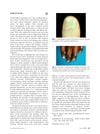 99 citations,
July 2017 in “Clinical Reviews in Allergy & Immunology”
99 citations,
July 2017 in “Clinical Reviews in Allergy & Immunology” New treatments for Alopecia Areata show promise but need to be more effective and affordable.
 77 citations,
June 2017 in “Advances in Therapy”
77 citations,
June 2017 in “Advances in Therapy” New treatments for Alopecia Areata, like JAK inhibitors, show promise for hair regrowth and are likely to change future treatment approaches.
 72 citations,
February 2011 in “The American Journal of Dermatopathology”
72 citations,
February 2011 in “The American Journal of Dermatopathology” Anti-TNF therapy can cause a unique type of hair loss that may get better with topical treatments without stopping the therapy.
56 citations,
October 2016 in “Journal of dermatological science” New insights into the causes and treatments for the autoimmune hair loss condition Alopecia areata have been made.
 36 citations,
May 2011 in “Dermatologic therapy”
36 citations,
May 2011 in “Dermatologic therapy” No treatments fully cure or prevent alopecia areata; some help but have side effects or need more research.
 30 citations,
May 2016 in “Expert Opinion on Biological Therapy”
30 citations,
May 2016 in “Expert Opinion on Biological Therapy” New treatments targeting immune pathways show promise for severe hair loss but need more research for safety and effectiveness.
26 citations,
October 2016 in “American journal of clinical dermatology” New treatments like JAK inhibitors show promise for reversing alopecia areata.
 17 citations,
September 2003 in “Journal of Investigative Dermatology Symposium Proceedings”
17 citations,
September 2003 in “Journal of Investigative Dermatology Symposium Proceedings” Old treatments for other skin conditions showed promise for hair regrowth in mice with a hair loss condition.
 4 citations,
November 2023 in “Frontiers in immunology”
4 citations,
November 2023 in “Frontiers in immunology” New treatments targeting T-cell pathways are needed for better alopecia areata management.
 July 2023 in “IntechOpen eBooks”
July 2023 in “IntechOpen eBooks” New treatments for alopecia areata show promise, but more research is needed to confirm their effectiveness.
 May 2023 in “Journal of medical case reports”
May 2023 in “Journal of medical case reports” A young girl with skin and scalp conditions showed some improvement with treatment.
 January 2023 in “International journal of homoeopathic sciences”
January 2023 in “International journal of homoeopathic sciences” The document says homoeopathic treatments are good for hair regrowth in alopecia areata but doesn't give proof.
 October 2020 in “Revista médica sinergía/Revista médica sinergia”
October 2020 in “Revista médica sinergía/Revista médica sinergia” Alopecia areata is a complex condition causing hair loss, linked to genetics and immune system issues, and may be related to other autoimmune diseases; treatments vary in effectiveness.
 January 2018 in “SOJ microbiology & infectious diseases”
January 2018 in “SOJ microbiology & infectious diseases” Etanercept, a psoriasis treatment, caused hair loss in a patient.
 74 citations,
May 2016 in “Current opinion in pediatrics, with evaluated MEDLINE/Current opinion in pediatrics”
74 citations,
May 2016 in “Current opinion in pediatrics, with evaluated MEDLINE/Current opinion in pediatrics” Both vitiligo and alopecia areata involve an immune response triggered by stress and specific genes, with treatments targeting this pathway showing potential.
19 citations,
January 2013 in “Annals of Dermatology” Early high-dose steroid treatment helps prolong disease-free periods in severe alopecia areata.
 15 citations,
January 2020 in “Experimental Dermatology”
15 citations,
January 2020 in “Experimental Dermatology” The document concludes that understanding and treatments for alopecia areata have significantly advanced, now recognizing it as an autoimmune disorder.
 38 citations,
January 2009 in “Journal of Cutaneous Medicine and Surgery”
38 citations,
January 2009 in “Journal of Cutaneous Medicine and Surgery” A woman developed hair loss after starting a treatment with adalimumab, suggesting this medication might cause hair loss.
 20 citations,
January 2018 in “Expert opinion on emerging drugs”
20 citations,
January 2018 in “Expert opinion on emerging drugs” JAK inhibitors may soon be a safe and effective treatment for alopecia areata.
 9 citations,
December 2017 in “The Journal of Allergy and Clinical Immunology”
9 citations,
December 2017 in “The Journal of Allergy and Clinical Immunology” New targeted therapies for hair loss from alopecia areata show promise, with personalized treatment expected in the future.
 82 citations,
March 2016 in “Autoimmunity reviews”
82 citations,
March 2016 in “Autoimmunity reviews” Animal models have helped understand hair loss from alopecia areata and find new treatments.
 1 citations,
January 2017 in “Springer eBooks”
1 citations,
January 2017 in “Springer eBooks” Understanding the immune-related causes of Alopecia Areata has led to potential treatments like JAK inhibitors.
 January 2016 in “Springer eBooks”
January 2016 in “Springer eBooks” Alopecia Areata is an unpredictable autoimmune hair loss condition with limited and variable treatment effectiveness.
 February 2021 in “Journal of pharmaceutical and biological sciences”
February 2021 in “Journal of pharmaceutical and biological sciences” No cure exists for alopecia areata, and treatments are personalized.
 85 citations,
October 2012 in “Dermatologic Clinics”
85 citations,
October 2012 in “Dermatologic Clinics” Alopecia Areata is an autoimmune condition often starting before age 20, with varied treatment success and a need for personalized treatment plans.
 2 citations,
June 2018 in “Journal of the American Academy of Dermatology”
2 citations,
June 2018 in “Journal of the American Academy of Dermatology” Alopecia areata causes varying hair loss and nail changes, and treatments include topical, systemic, and injectable therapies.
 1 citations,
June 2023 in “Genes”
1 citations,
June 2023 in “Genes” Hair loss from Alopecia Areata is caused by both genes and environment, with several treatments available but challenges in cost and relapse remain.
 1 citations,
July 2018 in “Elsevier eBooks”
1 citations,
July 2018 in “Elsevier eBooks” Alopecia Areata is an autoimmune hair loss condition, with various treatments showing mixed effectiveness and no guaranteed cure.
 December 2023 in “Acta dermato-venereologica”
December 2023 in “Acta dermato-venereologica” Tofacitinib is effective for treating alopecia areata, and starting treatment early may improve results.
 222 citations,
September 2016 in “JCI insight”
222 citations,
September 2016 in “JCI insight” Tofacitinib is safe and effective for severe alopecia areata, but hair loss may return 2 months after stopping treatment.



























